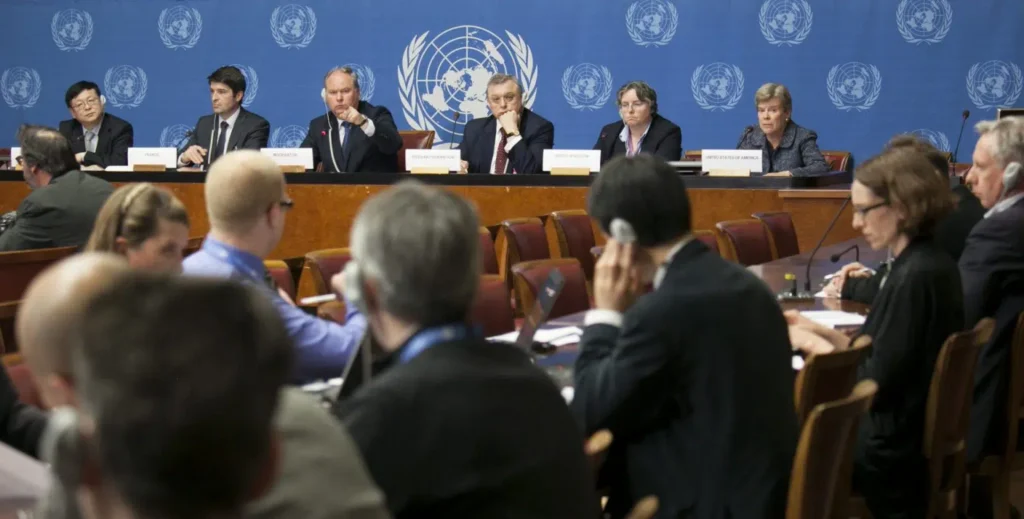
The five nuclear-weapon maintaining countries within the Nuclear Non-Proliferation Treaty (NPT) published a combined statement on preventing nuclear war and avoiding arms races.
Five global nuclear powers, China, Russia, U.S., U.K., and France, promised to prevent atomic weapons from circulating and avoid nuclear disputes.
The pledge was made in a rare joint statement ahead of a review of the Non-Proliferation Treaty (NPT) 1970
What is Non-Proliferation Treaty
- The NPT is a worldwide agreement whose objective is to avoid the spread of nuclear weapons and weapons technology, to enable the peaceful uses of nuclear energy, and to further the goal of disarmament (Disarmament is the act of reducing, limiting, or abolishing weapons)
- The treaty was signed in 1968 and entered into force in 1970. Presently, it has 190 member states.
- India is one of the only five countries that either did not sign the NPT or signed but withdrew later, thus becoming part of a list that includes Pakistan, Israel, North Korea, and South Sudan.
What status of India in NPT
India refused to sign NPT because
(1) The NPT defines “nuclear weapons states” as those that tested devices before 1967, which means India cannot ever be one.
(2) No fixed timelines have been mentioned for disarmament.
(3) NPT is an unfair treaty as nuclear-weapon states have no obligation to give them up while non-nuclear states are not allowed to have them.
India conducted its first Nuclear test -Pokhran-I (Smiling Buddha), in 1974.
The nuclear powers were convinced that the Nuclear Non-Proliferation Treaty (NPT) alone would not halt the spread of nuclear weapons. Thereafter, NSG was formed in 1974. The current guidelines of NSG state that a non-NPT state cannot become a member of NSG which keeps India out of the group.
Being a non-signatory to NPT, India is normally not to be considered for NSG membership
* Following the India-US civil nuclear deal of 2006, the US lobbied hard for an exception for India, citing the country’s impeccable record
* In 2008, NSG members agreed to grant India a “clean waiver” from its existing rules, in exchange for a commitment to “no nuclear trade with non-NPT countries”
* Russia, France, UK, Germany, Italy, Turkey and several other countries have subsequently supported India’s membership bid
* China has steadfastly opposed India’s inclusion in the NSG, citing the non-NPT status and unwilling to make an exception
* New Zealand, Ireland and Austria have also opposed India, citing the same clause
What is the status of NPT today and ahead
- Growing energy demands have led to a growing number of countries maintaining nuclear energy, and many countries wish to be energy-independent, to guarantee a sustainable and dependable domestic energy supply. As clean energy, development, and peaceful coexistence are essential for every country.
- More regions in the world (preferably comprising Nuclear-Weapon States (NWS) ) should enter into an arrangement of establishing Nuclear-weapon-free zones.
- Further, the Treaty on the Prohibition of Nuclear Weapons is a step in the right direction for nuclear disarmament.
However, things on the ground paint a depressing picture. The growth of China has led other countries within its immediate sphere of geographical impact to wonder if they need to develop strategic capabilities to safeguard their sovereignty.
The existing problem relating to Ukraine and Russia is also very tense.
Also Australia, through AUKUS, seems to be on a path to acquire nuclear capabilities for its naval fleet, to counter China.
Australia is already on the road to developing nuclear capabilities, it stands to reason that other nations would work towards developing or acquiring nuclear weapons. This could, in principle, also re-ignite another arms race.
we write articles from top news sources of India and international news web portals. Because to understand the topics in a depth we need to read more than one source for the UPSC IAS exam. So every article got credit to PIB, The Hindu, Indian Express, Business Standard,NDTV, CNN, etc. And the conclusion of this article is also available on our youtube channel. Thanks for your love and support and queries and suggestions just mail us at [email protected].
